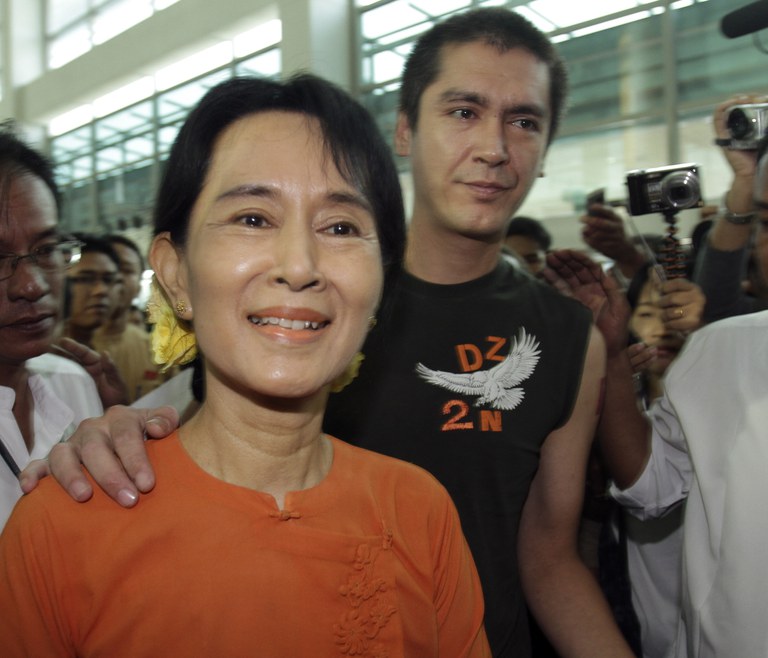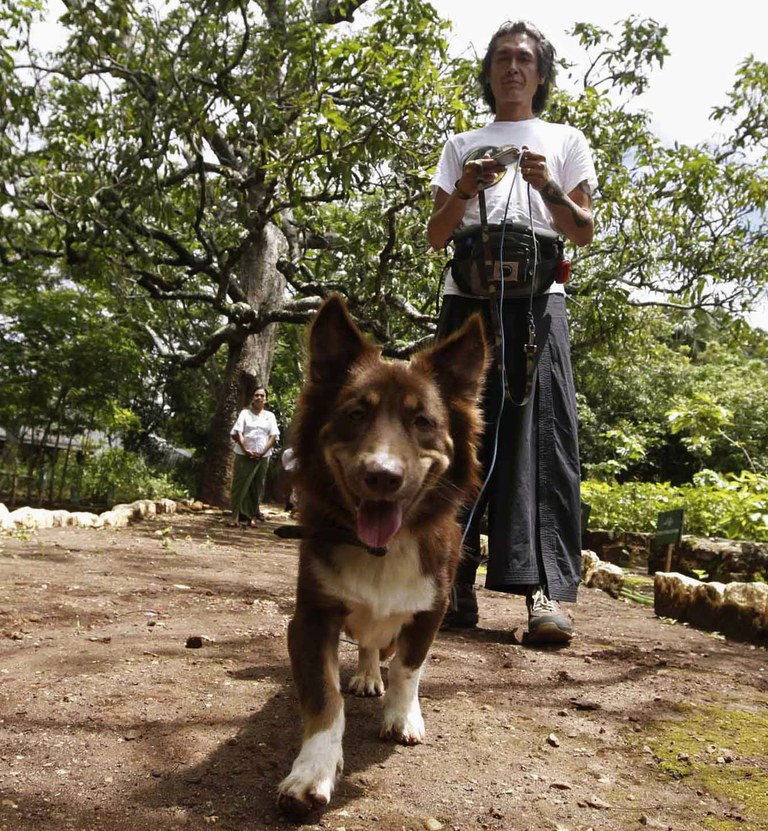Radio Free Asia’s Soe San Aung spoke with Kim Aris, the son of former State Counselor Aung San Suu Kyi, last week.
Suu Kyi served as Myanmar’s de facto leader following national elections in 2015, which her National League of Democracy won by a landslide. The party also won the 2020 national elections, but the military seized power from the democratically elected government on Feb. 1, 2021.
The army immediately arrested civilian leaders, including Suu Kyi, who were in Naypyidaw for the convening of the newly elected lower house of parliament. She was held at Naypyidaw Prison until last month, when a source told RFA that she was relocated to “a more comfortable state-owned residence.”
Aris is living in the United Kingdom and has been unable to contact his mother since the military coup.

RFA: You’ve been involved in supporting the Burmese community in London and you’ve been finding funds to support back home. First, tell me what you’ve been doing to support the spring revolution, the nationwide wave of popular resistance to the Myanmar military following the 2021 coup.
Kim Aris: But I never really wish to be a public figure. I kind of already stand by and see what others do and what is needed. And as my mother’s son, I have a unique position whereby I can speak out to the world. Outside of the Burmese community, people aren’t very aware of what’s happening. So I’m doing what I can to raise funds and awareness for the cause.
RFA: As we know, your mother, Aung San Suu Kyi, was once given the chance to leave Burma, but chose to stay with the Burmese people over her family. How would you describe your mother?
Kim Aris: It always saddens and angers me that my mother has sometimes been portrayed as cold hearted because she was unable to be by my father’s side while he was dying. I was nursing him at that time, and I can say that he did not wish for her to return to England.
We wanted to be by her side in Burma. Unfortunately, the military couldn’t find it in their heart to allow him his dying wish. And from my point of view, I’ve never felt like she left me. I was with her when she was first put under house arrest in Burma. And it never felt like she abandoned me in any way.
Also in Burma, everybody’s now lost their parents to the military. It’s not as though I’ve actually lost my mother. People in Burma are going through far worse than what I have been through. It’s lucky for me that my mother left me here in England, where it’s safe. I feel privileged. Compared to what’s happening to the people in Burma, I have a very easy life.

RFA: Now your mother, Aung San Suu Kyi, is under house arrest again. Have you had any contact with her?
Kim Aris: As far as I’m aware, she’s not actually under house arrest. She’s in prison somewhere. The military has said that she’s been moved into house arrest, but there’s been no evidence that that’s actually the case.
I have had no contact with her. And the military hasn’t responded to any requests I have made for contact or to inform me of her whereabouts. In the past, I have had some contact when she was under house arrest in Yangon, but now I don’t know what condition she’s being kept under or where she is.
RFA: We are aware that you went to the Burmese embassy to give a birthday gift to your mother, but they didn’t let you in and they didn’t even say anything to you. How many times have you sent a request to the junta to get in contact with her?
Kim Aris: There’s actually very little point to corresponding with these people because I haven’t received any response ever. So I’ve tried various other avenues, such as through the British Foreign Office and via the International Red Cross, but they’ve had the same result, which is no response.
RFA: I’m sorry to hear that. But in the last amnesty, they commuted some of your mother’s sentence. What was your reaction?
Kim Aris: It’s a military gesture. The military has used these tactics in the past to try and appease the international community whilst they still continue to perpetrate all sorts of atrocities against their own people every day. And even with the reduced sentence, my mother would still be over 100 when she’s released.
RFA: So you’ve been back to Burma, like when your mother was released in 2010. What was your perception about the country?
Kim Aris: Well, obviously the situation there was incredibly sad, especially since the country was going through a period of development. There was a great deal to look forward to. Now, all of that has been taken away. The country has gone backwards since the coup. So it seems like it is worse now than it was back in 1988.
RFA: Yeah, it’s like the country is in chaos right now. You know, young people are fighting back for their freedom. What’s your point of view about today’s crisis?
Kim Aris: Well, from what I can gather, the situation is not sustainable for anybody. The military aren’t as strong as people think they may be. They have lots of high tech weaponry, but they do not have the manpower that the people have. And I hope that this war cannot go on for too much longer. No more bloodshed.
But obviously, that’s not going to happen any time soon. Hopefully things will play out before two years’ time. The military will collapse, but we’ll see.
RFA: What if you had a chance to talk directly with Senior Gen. Min Aung Hlaing, the chairman of the junta’s governing body?
Kim Aris: I would ask him to stop waging this war against his own people. The resolve and fortitude of the Burmese people is absolute. They will never accept the military rule, and the youth of Burma will never accept having their freedom taken away. Now, for the first time in a long time, all the different ethnicities are starting to work together, and that shows that the army will never win this war.
RFA: What hope do you have for Burma?
Kim Aris: I hope that Burma will achieve the freedom that it’s been looking for so many years now. And that people can start to rebuild their lives. In the future, hopefully people will be united and be able to work together in a more inclusive manner.

RFA: Burmese people asking for international help. As Aung San Suu Kyi’s son, what is your message to the international community?
Kim Aris: I would ask the international community not to stand by and let the military junta brazenly commit crimes against humanity. I would ask them to increase humanitarian assistance and support organizations that are actually able to get aid to the areas which are in need. Also, to impose more targeted and effective sanctions against the junta. Also to recognize a meaningful dialogue with the shadow National Unity Government.
As stated in a recent UN report, war crimes committed by Burma’s military, including the vengeance bombings, is becoming increasingly frequent. 1.7 million civilians have been displaced, over 15,000 arrested and 6,000 killed. The military are conducting a war on their own people, regardless of race, ethnicity or religion. 17.6 million civilians are now in urgent need of lifesaving aid, protection and support.
Recent floods triggered by heavy monsoon rains have added to this crisis, with a further 50,000 people displaced. A regime that uses airstrikes against civilian villages, then returns to kill mothers and children while they are collecting the dead for burial. It’s a situation that needs to be addressed by the international community, who seem to be happy to stand aside and let this happen.
RFA: We have learned that your mother doesn’t want you to get involved in politics. Is that true? Did she ever say anything to you?
Kim Aris: Yeah, she’s never wanted me to be involved in politics. I’ve never wanted to be involved in politics. As I said, I would much rather not be any sort of a public figure. But since the military are not allowing me any access to my mother at all, I feel like I need to do something to try my best to help the situation in Burma.
After all, my mother cannot tell me what she thinks. So I have to think what she would want me to be doing. And I know she would want me to be helping where I can.
RFA: Do you hold out hope that she would be set free again?
Kim Aris: Absolutely. I cannot see the situation in Burma continuing as it is. I hope she will be free – along with all the other political prisoners in the country – and can find peace again.

RFA: What is your message to the people who are fighting for democracy in Burma, especially young people?
Kim Aris: I would say never give up. And this fight is one that cannot be lost. The military will never win. And the rest of the world is thinking about what is happening today, even though it doesn’t seem like it. Sometimes people around the world are trying to help.
RFA: By the way, I have seen the pictures with your mother and Taichito (Aung San Suu Kyi’s dog). We know you left Taichito with your mother in Burma. What is his situation now?
Kim Aris: I believe he is in Yangon. I’m not sure where exactly. He’s getting old. His eyesight isn’t as good as it was, and I’m sure he’ll be missing May May (Burmese word for Mommy).



